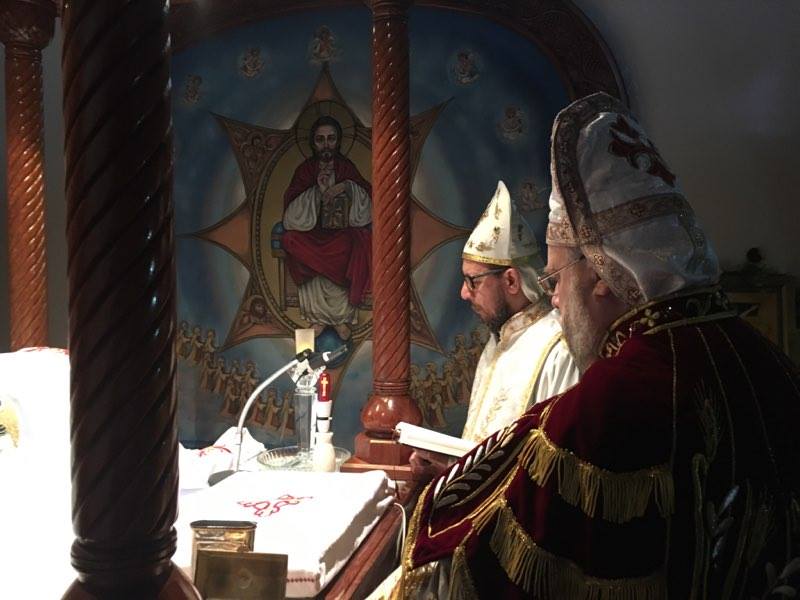
I want to write a little about my experience of Holy Week while it is still fresh for me. Not simply to describe the things I found myself doing, but to reflect on what it has meant to me, and the aspects of our Orthodox Christian faith which have come into greater focus.
As far as actual activities are concerned, I travelled up to Stoke on Trent on Lazarus Saturday and celebrated the Liturgy there before driving up through the beautiful countryside towards Stockport, where I prayed the Midnight Praises, and stayed overnight so that I could celebrate Palm Sunday at the Coptic Orthodox Church of St Mary and St Mina. I returned home to Kent, after the General Funeral Service, and headed back up to the Midlands on Wednesday afternoon. I was intending to drive to Stockport again, but Father Bishoy called me and asked me to join him at the new church of St Mary and St Cyril in Liverpool. I prayed the Eve of Thursday Hours with him and the congregation there before driving over to Stockport to stay in the church. I was intending to spend the rest of Holy Week in the Midlands. On Holy Thursday I remained in Stockport and prayed the Morning and Evening Hours, the Washing of Feet, and the Liturgy with Father Bishoy.
I had an early start on Good Friday, and Father Bishoy drove me over to Liverpool where we spent a very long day. These included the beautiful prayers and hymns of the Morning Hours leading up to the Burial Service, and then the Apocalypse Service and Liturgy long into the night. The singing was all good, but some of it was outstandingly moving. I returned to Stockport in the small hours of the morning. Then, finally, on Great and Holy Saturday, after a time to myself in the hills around Stockport, I was truly blessed to participate in the Paschal Liturgy itself on Saturday evening. Afterwards there was no great celebration in the church because of the martyrdoms in Egypt on Palm Sunday. Instead, I was unexpectedly invited to spend the night at the home of a member of the congregation. On Sunday morning, after conversation long into the night, I had a happy time of conversation again, before heading home, physically exhausted but spiritually enriched.
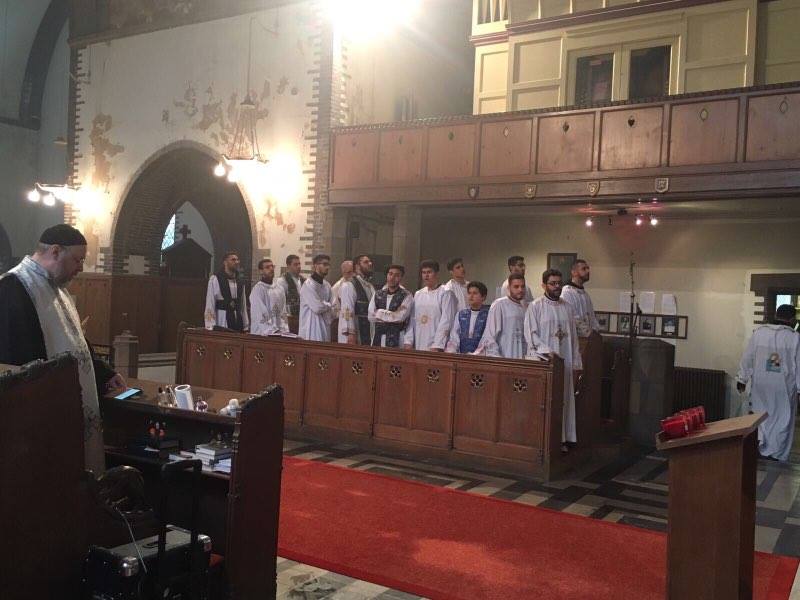
That was the practical side of my experience. It was, essentially, a complete immersion in the prayers and services for Holy Week in the Coptic Orthodox Church. Although I have been a member of the Coptic Orthodox Church for 23 years, and a priest for 8 years, this was, perhaps surprisingly to some, the first time I had been able to participate in all of the services in such depth and richness. Having been a member of the British Orthodox diocese within the Coptic Orthodox Church, much of my experience and service has been with small groups of Orthodox and enquirers, and as been based on the ancient Orthodox Liturgy of St James. This service has certainly been demanding and challenging, and required a commitment of all my time and energy, and that of others, but it meant that the resources were never available to celebrate the whole cycle of Holy Week as it was intended to be prayed.
Where the services were rather more familiar, the Paschal Hours, for instance, they were prayed more comprehensively, and with a large congregation they gained a depth which had not always been apparent to me before. There were other services which were not familiar to me, and I was blessed indeed to have such a kind and generous instructor in Father Bishoy. I felt that I was participating throughout the week, with those for whom these services and prayers were entirely familiar, and that this ancient spiritual journey of the Holy Week was one in which I was walking with so many others, and towards the same joyous destination.
Perhaps the first fruit of my reflections on this experience of Holy Week is that this Orthodox community in which I find myself is truly the spiritual family to which I belong. Those who know me well, or read my posts, will appreciate that I do not set one local Orthodox community against another. We are all the One, Holy, Catholic and Apostolic Church, or we are not Orthodox at all. But the Church is formed and gathered around particular bishops, whose ministry is to bring the Church as a community into being, and preserve each community in unity with the wider Church. I cannot express how fortunate I find myself to be under the supervising care of His Grace Bishop Angaelos, and to be invited to serve, week by week, in the Orthodox community gathered around His Grace Bishop Misael in the Diocese of the Midlands. This local Orthodox community is one in which I have found a great hospitality, unceasing kindness and increasing opportunities for service and continuing instruction in the rites of the Orthodox tradition of Alexandria. I am well aware of the problems at the Coptic Orthodox Church faces, but I also see the great potential in both our Orthodox spiritual and doctrinal Tradition, and in the energy and commitment of the members of the Church. Often the problems we face are the problems of life and youth. It seems to me that these offer much more hope than the problems of age and death which many Christian groups in the West are experiencing.
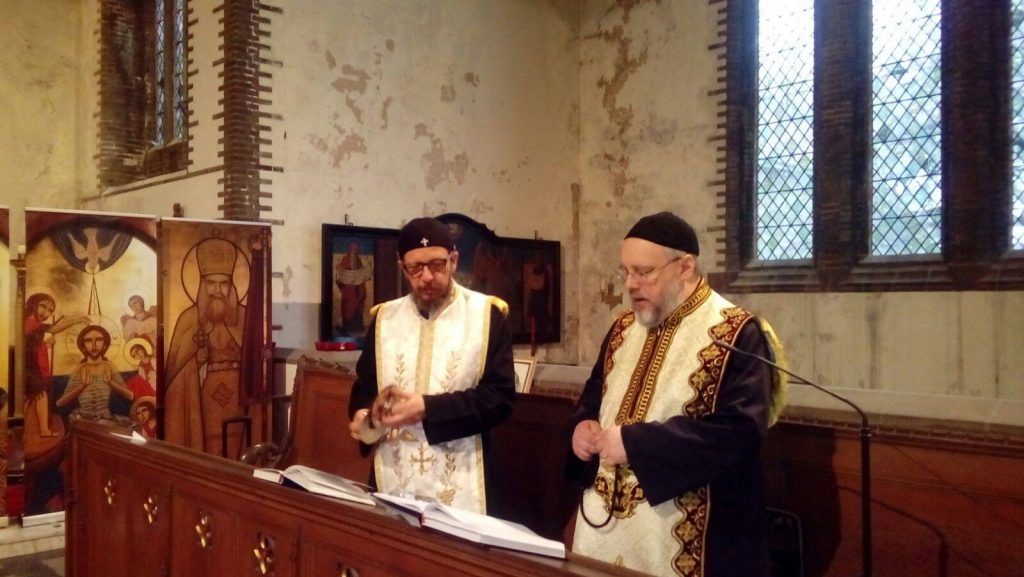
If I have a strong sense that I belong to this particular Orthodox community, and that this is my spiritual family, then I must consider, and I do consider, that we have to view each other and our Church in family terms. What does this mean for me in terms of my experience of Holy Week? It is that when we worship together this is not a performance, where some sort of musical perfection is the goal, and where the congregation are essentially passive observers of the altar service and the choir. When we worship God together it is the worship of the family, for good or bad, as competent according to the rites as we can manage. But an offering of worship in which each person’s contribution is essential and necessary. In a sense, and this does not excuse laziness, inattention and ignorance, our worship together is what it is. Perhaps there are aspects that could be improved, the mix of languages could be changed, the practical aspects of the liturgy performed more accurately. These are all things that can be considered. But they should be considered outside the liturgy and after the liturgy. I have definite views about language in worship, but when I am standing in worship with the Orthodox community to which I belong these questions have no place or space in my thoughts. Whatever we offer, when it is offered with sincerity, devotion and humility, is worthy to be lifted up in our family worship, our leit-ourgia, our work of the people.
It seemed to me that as we were caught up in the intensity of the prayer and worship of Holy Week, we were able to remain in prayerfulness whether the words being spoken at that moment were in English, Arabic or Coptic. What was being offered was something that represented us all, a congregation mixed backgrounds, spiritual attainment, understanding and education. I was not standing there in the middle of the people, or at the altar, to offer my own worship on my own terms, but to join in the worship of this particular group of people at this particular moment in time. And this is what it looks like!
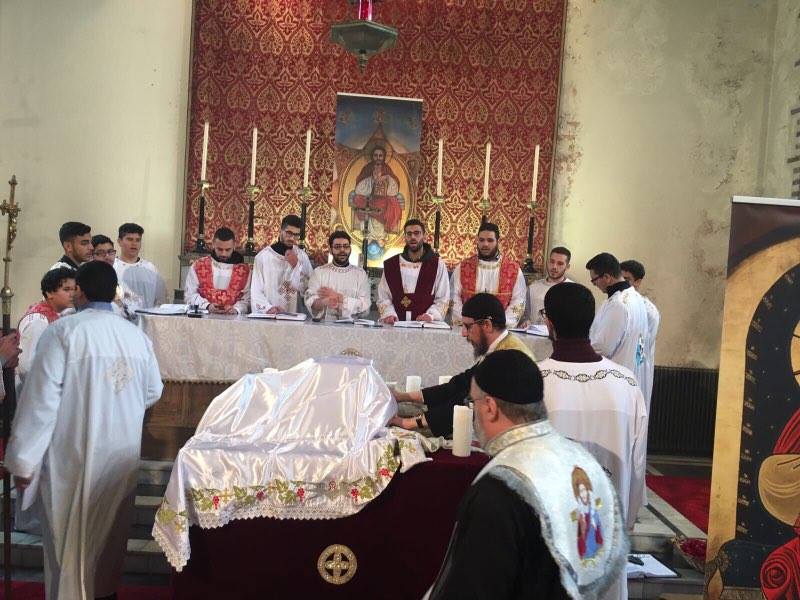
That doesn’t mean there is no proper time for questions and opinions. That doesn’t mean that there is no scope for developing the liturgy so that all can participate more fully. But in the middle of our worship, as we stand in prayer, there should be an overwhelming sense of humble, loving unity with all the others who are gathered together. And I experienced this during Holy Week.
What if others don’t? And I know from correspondence that not everyone does. It seems to me that in the Church itself, as we are worshipping God, we must express love and unity with those others with whom we are worshipping. This is not a matter of politeness but it is an essential aspect of our worship. How can we say that we love God who we have not seen, if we do not show this love to those whom he has united to himself, with us, in his own Body, the Church, and whom we can see and are right next to us. This does not mean we should engage in conversation before or during the prayers. But we should surely acknowledge in love those among whom we are standing and sitting. If we ignore those who are sitting next to us, who bear the image of God and are united to us in Christ more closely than by ties of blood, then how can we approach God in worship? In my own experience, I find just such an open-hearted welcome from the clergy among whom I serve, which I would wish that all experienced every Sunday sitting in the pews. This is within our own power, and is surely a proper preparation for worship. It requires only that we sincerely greet those around us before we pray together, so that our common prayers are acceptable to God.
Perhaps it is even harder for many to feel part of the family at the Agape meal afterwards. There is no need for rules and commandments. But in my experience, and I am fortunate to be rather visible as a priest, I sit down and people come up as they wish and speak to me. Whether I sit quietly or in conversation I feel happy and blessed to see and hear so much family activity going on. But there are others who feel uncomfortable and isolated. They may leave early because this is the most difficult time for them on a Sunday. The only rule we need to apply is the rule to love one another which our Lord Jesus gave us. It is this which shows that we are his disciples nothing else. What I say, I say to myself. We must look around more carefully. Who is the one sitting alone – I don’t mean myself. Who is the one at our table excluded by the language we are using – I don’t mean myself. How do we enter into the service of the Church and the world after receiving communion in the Body and Blood of the Lord Jesus? It is by welcoming and including in our concerns every member of his Body that gathers together afterwards. I say this to myself because I also need to be more perceptive.
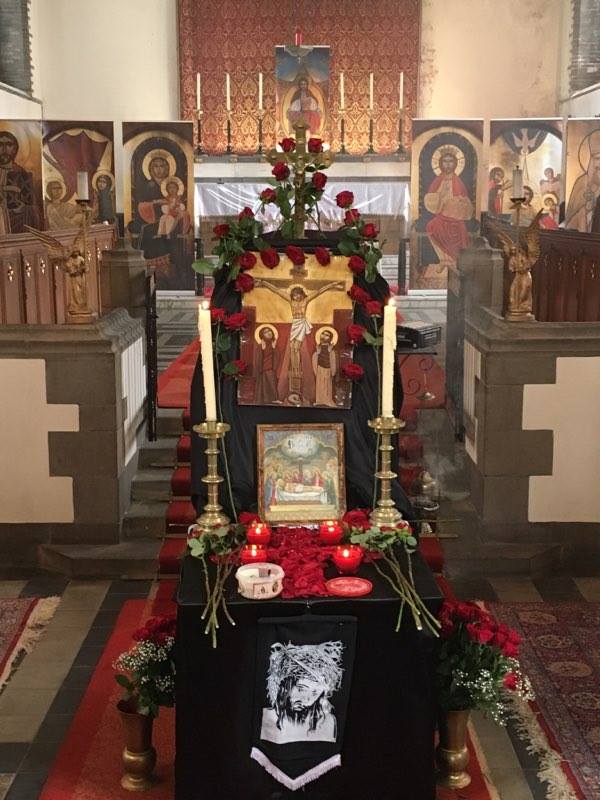 A final reflection on this Holy Week. I was so glad to see people from many different ethnicities and social classes worshipping together. This was an experience, for me, of the universality of the Orthodox Faith. None need be excluded. All are invited. I have no great position in the world. Although I have made the effort to become highly educated in our faith, and church history, I do not have a wealth of academic qualifications. I am not wealthy at all. But I have found a welcome in the Orthodox Church, where what matters is my service in the Church, and at the altar, and in pastoral ministry, not any of these other things. I know that I will not be asked what qualifications I have gained when I stand before the Great Judgement Seat of Christ, but he will ask me how I have lived. I know that I will not be asked what wealth or prestige I have gained when I stand before the Great Judgement Seat of Christ, but he will ask me how I have loved.
A final reflection on this Holy Week. I was so glad to see people from many different ethnicities and social classes worshipping together. This was an experience, for me, of the universality of the Orthodox Faith. None need be excluded. All are invited. I have no great position in the world. Although I have made the effort to become highly educated in our faith, and church history, I do not have a wealth of academic qualifications. I am not wealthy at all. But I have found a welcome in the Orthodox Church, where what matters is my service in the Church, and at the altar, and in pastoral ministry, not any of these other things. I know that I will not be asked what qualifications I have gained when I stand before the Great Judgement Seat of Christ, but he will ask me how I have lived. I know that I will not be asked what wealth or prestige I have gained when I stand before the Great Judgement Seat of Christ, but he will ask me how I have loved.
I am glad that such an attitude has been shown in my case, and that I am made welcome despite my lack of prestige, and wealth, and importance in the world. I often consider myself the one seated at the very end of the table and yet invited to come and sit up with the host himself. How important it is that we apply this to all those with whom we are joined in Christ. When we dismiss someone, and God forbid, hold them in contempt because of their lack of education or prestige in the world, it is Christ himself we are holding in contempt. Indeed, one of the aspects that I love most about our Orthodox Church is that it teaches us that our importance is not found in our wealth, education or importance in the world at all. It is found only in the interior and spiritual transformation and union with God which is open to all who seek it with all their heart. From a divine perspective the spiritual elite in a congregation may be entirely different to those whop seem most important. The most prayerful and devout, the most loving and humble, are those whom God commends. Thank God we may be such a spiritual man or woman, and a Doctor or Professor. But we may also be such spiritual men and women with a much more humble education and employment. If we are wise then we will not judge others, or ourselves, by external criteria.
Thank God that it is so. Otherwise I would have no possibility of achieving very much. I am not the most well educated, the most wealthy, the most important. Yet this possibility of union with God is open even to me, the least of all. And as we participate in this union so we start to see others with the eyes and mind of Christ, and value in them the increasing presence of God within the heart, rather than anything external.
I saw all of these things in my experience of Holy Week this year. An unconditional welcome, a universality of faith, and a valuing of those who are most spiritual, whatever their external circumstances and attainment. I hope that with grace I will be able to live out these ideals myself, and that we will continue to live them out together. It seems to me that if we neglect any of these then it is Christ himself we are turning away from our gathering together.
